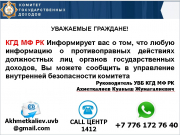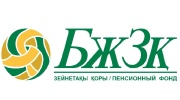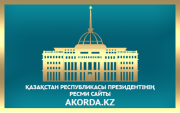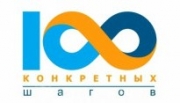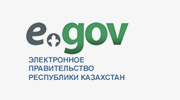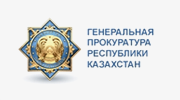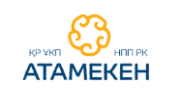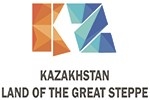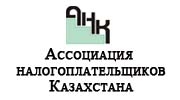
STATE REVENUE COMMITTEE OF THE
MINISTRY OF FINANCE OF THE REPUBLIC OF KAZAKHSTAN
PRESS RELEASE
Due to the introduction of the “Astana-1” IS in 2008 business saved 77,7 billion tenge
One of the priorities of trade facilitation is the maximum automation of customs processes.
This is an electronic declaration of goods using electronic documents.
For these purposes, Kazakhstan introduced the automated system of customs and tax administration “ASTANA-1”, which was developed on the platform ASYCUDA World, used in 95 countries of the world.
The main task is to simplify and speed up customs procedures, increase the efficiency of collection of customs payments and taxes, and create a reliable basis for the implementation of the Single Window for export-import operations.
Considering that the ASTANA-1 IS is a multifunctional and complex system, its implementation was carried out in stages.
On October 1, 2017, the “Customs transit” subsystem was introduced.
On January 1, 2018 - the subsystem "Customs Declaration" under the customs procedure "Export" was introduced.
On April 1, 2018 - the subsystem "Customs Declaration" for the remaining customs procedures was introduced.
IS ASTANA-1 has a number of advantages, including the possibility of automated control of the entire customs process from the moment of submitting preliminary information, registration of transit, storage of goods in a temporary storage warehouse (TSW) until control after the release of goods.
The introduction of the automatic release of a declaration on goods has affected a significant reduction in the time of customs clearance of goods up to 1 minute, which is approximately 81% of the total number of declarations.
Reference:
- Over transit filed more than 691 thousand transit declarations, of which 95% released automatically in 1 minute.
- Over 120 thousand declarations of goods were submitted for export, of which 91% were issued by the system automatically in 1 minute.
- For import and other procedures, more than 417 thousand declarations for goods were filed, of which 65% of declarations were issued by the system automatically in 1 minute.
Automation of the customs declaration process allowed participants of foreign economic activity (PFEA) to save money in a temporary storage warehouse, brokers, consultants, and also eliminated other administrative resources that required significant costs for paper declaration, such as printing a declaration with all previous documents, travel expenses, and waiting in line for filing and issuing a declaration, providing copies of the declaration to the owners of a temporary storage warehouse for the release of goods s from a temporary storage warehouse, etc.
In general, due to the introduction of the ASTANA-1 information system in 2018, there was a reduction in time and financial costs, the business saved 77.7 billion tenge, which is a positive effect from the introduction of electronic declaration.
At the same time, due to the simplification of the declaration and economy of the business, the state budget additionally received 13.5 billion tenge, there was also an increase in the import of goods (excluding imports for which privileges on customs payments and taxes are granted) - 327 380 million tenge.
According to the survey of participants of foreign economic activity, due to the simplification of the declaration, about 20% of the released funds were invested in the trade turnover - 65,476 million tenge. More than 30% of participants of foreign economic activity refused broker services and saved - 17.7 billion tenge, administrative expenses decreased by 10%, carrier expenses decreased (just forwarding expenses, loading / unloading).
In addition, the automation of customs declaration allowed to provide:
- 100% of electronic declaration (rejection of paper documents);
- Online data exchange with government authorities;
- Online exchange of information with the customs services of the EAEU Member States and other countries;
- Tracking of goods from the moment of entry to the final sale;
- Single personal account;
- Unified risk management system;
- Declaration of goods from anywhere in the world;
- Control after the release of goods.
Increasing the international ratings of the Republic of Kazakhstan and the anti-corruption effect of the Astana-1 IS:
The Republic of Kazakhstan has received a positive assessment from international experts, and has risen in all major international ratings.
The Republic of Kazakhstan has received a positive assessment from international experts, and has risen in all major international ratings.
- according to the “Doing Business” rating “International Trade” to 21 position (from 123 to 102 place),
- according to the rating of “Global Competitiveness Index of the World Economic Forum” “Burden of customs procedures” by 15 positions (from 79th place to 64th place),
- according to the LPI rating “The effectiveness of the work of the customs authorities” to 21st position (from 86th place to 65th place).
The introduction of the project “Astana-1” had a positive impact on the business climate, and the automation of the customs process allowed reducing corruption risks by 87% across the Republic, taking into account the analysis of automatic release of declarations on all customs procedures (transit, import, export, other procedures).
Thus, the strategic goals of the State Revenue Committee of the Ministry of Finance of the Republic of Kazakhstan on automating the process of customs clearance of at least 80% and reducing the time of customs clearance by shifting the emphasis from the customs clearance stage to the stage after the release of goods were achieved.
Press-office
State Revenue Committee
Ministry of Finance of the RK
(Zhenis avenue, 11)














